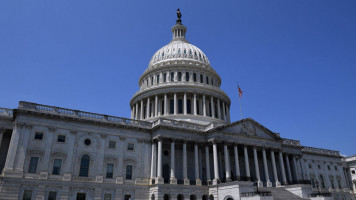Yemen urges international community to take 'firm stance' against Houthi threats
The Yemeni government on Friday called on the international community to take a firm position against violations committed by the Houthi rebel group against Yemeni journalists.
The demand was made during a meeting in Paris between the Minister of Information, Culture and Tourism, Muammar Al-Eryani and Tawfik Jelassi, who is the assistant Director-General of UNSECO’s Information and Communication sector, according to the official Yemeni News Agency, Saba.
Al-Eryani called on international organisations to take "a firmer stance towards the violations committed by the Houthi militia against journalists and the media in their areas of control".
He further elaborated that "the Houthi group committed crimes against 160 journalists [most of whom were subjected to enforced disappearance and torture], including 49 dead and thousands displaced". He did not specify the timeline of the alleged crimes.
Many media institutions, including broadcast stations, newspapers, news websites, and radio stations have been looted, while several news websites blocked. Many news outlets "have been subjected to threats, confiscation of their equipment belongings, and suspension of salaries", he said.
The minister also accused the Iran-backed rebels, notably their leader Abdul-Malik Al-Houthi, of "verbally inciting violence incitement speeches" against media professionals, describing them as "more dangerous than the fighters on the fronts".
Many Yemeni journalists have also been sentenced to death, which has been condemned by human rights groups.
Jelassi expressed "the organisation's readiness to provide technical and legal support to journalists and media institutions through targeted training programs and to contribute to building peace," according to the Yemeni outlet.
Yemen currently ranks 169th out of 180 countries on the World Press Freedom Index, issued by Reporters Without Borders (RSF).
Houthi rebels seized Sanaa in 2014 from the internationally-recognised government, triggering the Saudi-led intervention the following year.
As a result, Yemen has been afflicted by poverty, poor sanitation and rampant malnutrition affecting its population, particularly children. Aid groups have described the situation in Yemen as one of the world’s "worst humanitarian crises".

![Palestinians mourned the victims of an Israeli strike on Deir al-Balah [Getty]](/sites/default/files/styles/image_684x385/public/2024-11/GettyImages-2182362043.jpg?h=199d8c1f&itok=xSHZFbmc)


![The law could be enforced against teachers without prior notice [Getty]](/sites/default/files/styles/image_684x385/public/2178740715.jpeg?h=a5f2f23a&itok=hnqrCS4x)
 Follow the Middle East's top stories in English at The New Arab on Google News
Follow the Middle East's top stories in English at The New Arab on Google News


